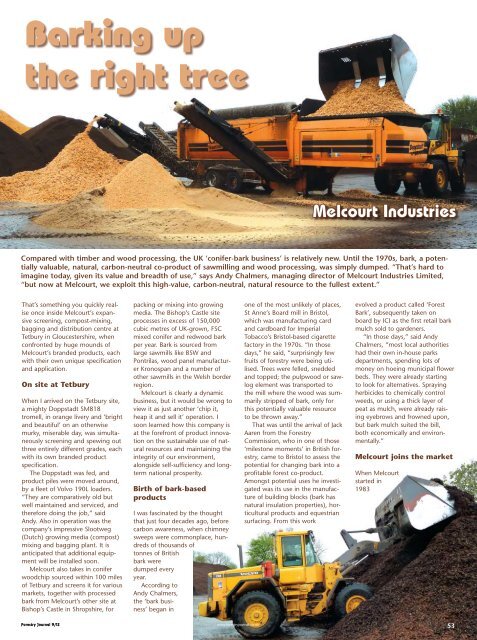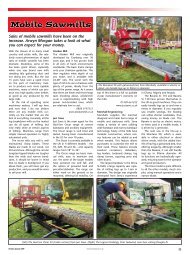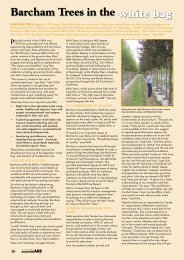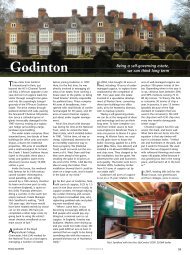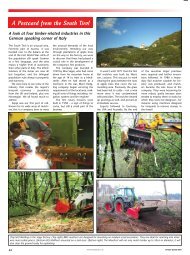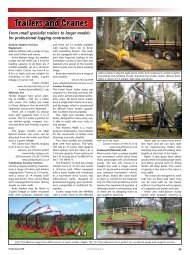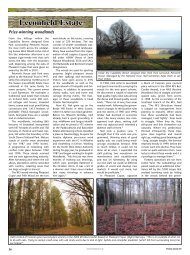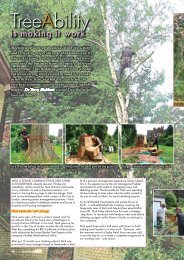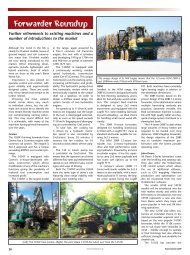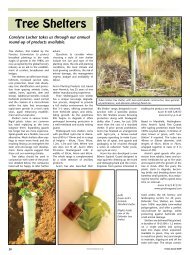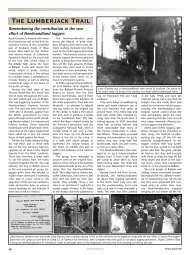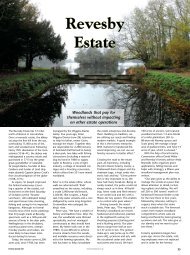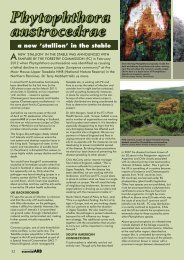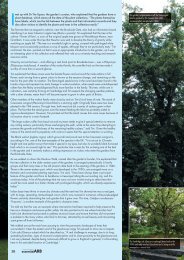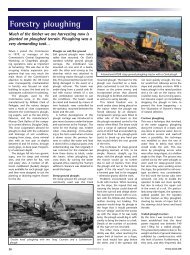Melcourt Industries - Forestry Journal
Melcourt Industries - Forestry Journal
Melcourt Industries - Forestry Journal
Create successful ePaper yourself
Turn your PDF publications into a flip-book with our unique Google optimized e-Paper software.
Barking up<br />
the right tree<br />
<strong>Melcourt</strong> <strong>Industries</strong><br />
Compared with timber and wood processing, the UK ‘conifer-bark business’ is relatively new. Until the 1970s, bark, a potentially<br />
valuable, natural, carbon-neutral co-product of sawmilling and wood processing, was simply dumped. “That’s hard to<br />
imagine today, given its value and breadth of use,” says Andy Chalmers, managing director of <strong>Melcourt</strong> <strong>Industries</strong> Limited,<br />
“but now at <strong>Melcourt</strong>, we exploit this high-value, carbon-neutral, natural resource to the fullest extent.”<br />
That’s something you quickly realise<br />
once inside <strong>Melcourt</strong>’s expansive<br />
screening, compost-mixing,<br />
bagging and distribution centre at<br />
Tetbury in Gloucestershire, when<br />
confronted by huge mounds of<br />
<strong>Melcourt</strong>’s branded products, each<br />
with their own unique specification<br />
and application.<br />
On site at Tetbury<br />
When I arrived on the Tetbury site,<br />
a mighty Doppstadt SM818<br />
tromell, in orange livery and ‘bright<br />
and beautiful’ on an otherwise<br />
murky, miserable day, was simultaneously<br />
screening and spewing out<br />
three entirely different grades, each<br />
with its own branded product<br />
specification.<br />
The Doppstadt was fed, and<br />
product piles were moved around,<br />
by a fleet of Volvo 190L loaders.<br />
“They are comparatively old but<br />
well maintained and serviced, and<br />
therefore doing the job,” said<br />
Andy. Also in operation was the<br />
company’s impressive Slootweg<br />
(Dutch) growing media (compost)<br />
mixing and bagging plant. It is<br />
anticipated that additional equipment<br />
will be installed soon.<br />
<strong>Melcourt</strong> also takes in conifer<br />
woodchip sourced within 100 miles<br />
of Tetbury and screens it for various<br />
markets, together with processed<br />
bark from <strong>Melcourt</strong>’s other site at<br />
Bishop’s Castle in Shropshire, for<br />
packing or mixing into growing<br />
media. The Bishop’s Castle site<br />
processes in excess of 150,000<br />
cubic metres of UK-grown, FSC<br />
mixed conifer and redwood bark<br />
per year. Bark is sourced from<br />
large sawmills like BSW and<br />
Pontrilas, wood panel manufacturer<br />
Kronospan and a number of<br />
other sawmills in the Welsh border<br />
region.<br />
<strong>Melcourt</strong> is clearly a dynamic<br />
business, but it would be wrong to<br />
view it as just another ‘chip it,<br />
heap it and sell it’ operation. I<br />
soon learned how this company is<br />
at the forefront of product innovation<br />
on the sustainable use of natural<br />
resources and maintaining the<br />
integrity of our environment,<br />
alongside self-sufficiency and longterm<br />
national prosperity.<br />
Birth of bark-based<br />
products<br />
I was fascinated by the thought<br />
that just four decades ago, before<br />
carbon awareness, when chimney<br />
sweeps were commonplace, hundreds<br />
of thousands of<br />
tonnes of British<br />
bark were<br />
dumped every<br />
year.<br />
According to<br />
Andy Chalmers,<br />
the ‘bark business’<br />
began in<br />
one of the most unlikely of places,<br />
St Anne’s Board mill in Bristol,<br />
which was manufacturing card<br />
and cardboard for Imperial<br />
Tobacco’s Bristol-based cigarette<br />
factory in the 1970s. “In those<br />
days,” he said, “surprisingly few<br />
fruits of forestry were being utilised.<br />
Trees were felled, snedded<br />
and topped; the pulpwood or sawlog<br />
element was transported to<br />
the mill where the wood was summarily<br />
stripped of bark, only for<br />
this potentially valuable resource<br />
to be thrown away.”<br />
That was until the arrival of Jack<br />
Aaren from the <strong>Forestry</strong><br />
Commission, who in one of those<br />
‘milestone moments’ in British forestry,<br />
came to Bristol to assess the<br />
potential for changing bark into a<br />
profitable forest co-product.<br />
Amongst potential uses he investigated<br />
was its use in the manufacture<br />
of building blocks (bark has<br />
natural insulation properties), horticultural<br />
products and equestrian<br />
surfacing. From this work<br />
evolved a product called ‘Forest<br />
Bark’, subsequently taken on<br />
board by ICI as the first retail bark<br />
mulch sold to gardeners.<br />
“In those days,” said Andy<br />
Chalmers, “most local authorities<br />
had their own in-house parks<br />
departments, spending lots of<br />
money on hoeing municipal flower<br />
beds. They were already starting<br />
to look for alternatives. Spraying<br />
herbicides to chemically control<br />
weeds, or using a thick layer of<br />
peat as mulch, were already raising<br />
eyebrows and frowned upon,<br />
but bark mulch suited the bill,<br />
both economically and environmentally.”<br />
<strong>Melcourt</strong> joins the market<br />
When <strong>Melcourt</strong><br />
started in<br />
1983<br />
<strong>Forestry</strong> <strong>Journal</strong> 9/12<br />
www.forestryjournal.co.uk<br />
53
(75% owned by<br />
Charles Ransford &<br />
Sons of Bishop’s<br />
Castle in Shropshire<br />
and 25% by John<br />
Latter), there were<br />
already two companies<br />
in the fledgling<br />
bark market: Bristol<br />
Bark Products, a<br />
spin-off from Jack<br />
Aaren’s pioneering<br />
work, selling three<br />
simple grades of<br />
bark (coarse, medium<br />
and fine) of variable<br />
quality. The other company<br />
was Camland Products Ltd, based<br />
in East Anglia. They were using<br />
bark from several species of conifer<br />
(mainly Corsican and Scots pine)<br />
sourced from Thetford Forest and<br />
FC’s Brandon Central Depot. The<br />
timber was processed into pit<br />
props and telegraph poles.<br />
Camland purchased the bark and<br />
screened it into dedicated products<br />
for specialist markets, including<br />
mulch and soil compost, for the<br />
Greater London Council and horticultural<br />
growers.<br />
<strong>Melcourt</strong>, as the ‘new kid on the<br />
block’, was faced with either copying<br />
these companies and selling at<br />
a cheaper price, or finding out<br />
exactly what the market wanted<br />
and manufacturing products to<br />
suit. They made enquiries of landscape<br />
contractors. “They came<br />
back with three core requirements,”<br />
said Andy Chalmers,<br />
“prompt telephone answering with<br />
delivered prices quoted while they<br />
were on the phone, guaranteed<br />
delivery times and consistent product<br />
quality, load after load.<br />
“They also told us that we needed<br />
to speak to landscape architects<br />
and garden designers, who were in<br />
Bagging <strong>Melcourt</strong> ‘Topgrow’ tree and shrub planting compost.<br />
pole position in specifying the<br />
products to be used. What came<br />
back was a basic question: ‘What is<br />
bark’ There was no industry-wide<br />
specification and no British<br />
Standard for these new products.<br />
From this feedback <strong>Melcourt</strong><br />
identified the markets it wished to<br />
service and went on to develop a<br />
range of different grades of bark<br />
and woodchip products.<br />
In the rapid development that<br />
followed, <strong>Melcourt</strong> introduced<br />
product ranges to cover all applications,<br />
with brochures to assist in<br />
choosing the right product and<br />
specification. They also raised the<br />
industry profile by exhibiting at<br />
trade exhibitions.<br />
Ready for take off<br />
“There was an initial delay,” says<br />
Andy Chalmers, “as the market<br />
took time to gel, but it eventually<br />
took off in the early 1980s. Local<br />
authorities quickly became our biggest<br />
customers, each with its own<br />
parks and landscaping department,<br />
equipped with a substantial budget<br />
and a clerk of works who ensured<br />
that what was specified was actually<br />
done.<br />
“In those ‘halcyon days’, raw<br />
bark was quite cheap to source and<br />
this helped accelerate our market.<br />
Things began to change in the<br />
1990s. Local authority budgets<br />
were progressively cut, but new<br />
customers such as superstores and<br />
business/industrial parks stepped in<br />
to fill the breach.”<br />
Another key factor in <strong>Melcourt</strong>’s<br />
development was the formation of<br />
an efficient distribution network.<br />
“Most of our products are now<br />
supplied loose in quantities up to<br />
80 cubic metres” said Andy<br />
Chalmers, “but we additionally<br />
have a network of over 100 master<br />
stockists who split them into smaller<br />
quantities and sell them on to<br />
local users. We have also developed<br />
a range of bagged products aimed<br />
at the retail market.”<br />
Today, <strong>Melcourt</strong> offers 19 branded<br />
products covering mulches, soil<br />
ameliorants, planting composts<br />
and walk surfaces.<br />
Ups and downs<br />
Varying market conditions over the<br />
last three decades, as much, if not<br />
more, on the supply side, have<br />
The Doppstadt SM-818 was producing<br />
three different product<br />
specifications simultaneously.<br />
been ridden out by<br />
exploration and<br />
innovation. In the<br />
early days, bark was<br />
essentially free, the<br />
only cost being that<br />
of collection. But<br />
the forestry industry<br />
soon got wise and<br />
British bark, particularly<br />
pine bark,<br />
increased in price.<br />
<strong>Melcourt</strong> started to<br />
look abroad and in<br />
2005 started to<br />
import 40,000<br />
cubic metres of Maritime pine bark<br />
per annum from Spain. This worked<br />
fine for ten or more years until the<br />
credit crunch, some five years ago,<br />
when Spain’s economy, especially<br />
the construction sector, was<br />
blitzed. The market for timber collapsed,<br />
resulting in the closure of<br />
sawmills and a sudden dearth of<br />
bark.<br />
<strong>Melcourt</strong> took another look<br />
around the UK and secured a partnership<br />
with a company based in<br />
Norfolk to buy up to 50,000 cubic<br />
metres of processed bark, sourced<br />
from Corsican and Scots pine in<br />
the Thetford Forest area. All of the<br />
company’s haulage requirements<br />
are subcontracted out. Raw materials<br />
coming in are with AW<br />
Jenkinson which has a four-man<br />
team on site at Tetbury monitoring<br />
the movements of 70+ trucks.<br />
Loose products going out are also<br />
handled by AW Jenkinson, and<br />
packed products by Hacklings,<br />
which is part of the PalletLine<br />
Group.<br />
“Ninety five per cent of our<br />
business is in the UK,” said Andy<br />
Chalmers, “but we are moving forward<br />
with exports, mainly into the<br />
Far East (Malaysia, Vietnam, Hong<br />
Kong and China), especially for our<br />
Bio-Filtration Solutions range of<br />
products, including <strong>Melcourt</strong><br />
Heather, raw material for which is<br />
sourced from the North Yorkshire<br />
Moors.” Bio-Filtration Solutions is a<br />
range of peat-free, recyclable, natural<br />
air filtration materials used by<br />
industries such as sewage, sludge<br />
and waste-water treatment plants,<br />
abattoirs, animal by-product rendering<br />
and food processors, to cure<br />
the problem of ‘nasty niffs’.<br />
<strong>Melcourt</strong> <strong>Industries</strong> now turns<br />
over £5million a year and is 50%<br />
owned by Charles Ransford & Sons<br />
and 50% by Alan Jenkinson, whose<br />
business interests include half ownership<br />
of Berite Sawmills Limited, as<br />
well as the haulage company that<br />
carries his name.<br />
54<br />
www.forestryjournal.co.uk<br />
<strong>Forestry</strong> <strong>Journal</strong> 9/12
Down to earth<br />
Managing Director Andy Chalmers has many years of<br />
hands-on experience in forestry.<br />
In what was clearly a milestone<br />
moment for <strong>Melcourt</strong>’s product<br />
expansion and development, the<br />
company embarked on supplying<br />
peat-free growing<br />
media in the 1990s. Now<br />
they claim to be the only<br />
UK specialist providing<br />
bark- and wood-based<br />
compost ingredients and<br />
peat replacement growing<br />
media.<br />
These are clearly<br />
timely developments<br />
given<br />
Government-set<br />
targets are for all<br />
local authority and<br />
central government<br />
contracts to<br />
be peat free by<br />
2015, followed by<br />
all retail products<br />
in 2020 and professional<br />
growing<br />
media ten years<br />
later. “All <strong>Melcourt</strong><br />
barks originate<br />
from British or<br />
European forests managed on a<br />
fully sustained basis. We subscribe<br />
to both the FSC and the Soil<br />
Association and use products with<br />
these certifications wherever possible,”<br />
says Andy Chalmers.<br />
Supply and demand<br />
Whilst Andy Chalmers spends a lot<br />
of time with customers in the arb,<br />
amenity, landscape and leisure sectors,<br />
he is in fact a forester, having<br />
come up through the FC and private<br />
companies (including UPM<br />
Tilhill, Fountain <strong>Forestry</strong>, Forest<br />
Thinnings and EFG plc) both at<br />
home and abroad. He even<br />
remembers selling sawlogs to G<br />
Halsey’s Sawmill at London Colney<br />
(near St Albans) in Hertfordshire,<br />
where my grandfather worked for<br />
50 years before it was closed to<br />
make way for housing some 40<br />
years ago.<br />
As an experienced forester and MD<br />
of a company that needs British<br />
conifer bark, Andy Chalmers sees<br />
the need for UK forestry to replant<br />
all the conifers clearfelled and to<br />
massively extend planting. The<br />
industry needs to provide the<br />
resources required for timber and<br />
wood processes and associated<br />
natural materials like bark, on<br />
which his company relies.<br />
The impending shortfall of<br />
UK-grown conifer bark resources<br />
could set a ceiling on companies<br />
like <strong>Melcourt</strong>. The professional<br />
growing media market, for example,<br />
supplies 1 million cubic metres<br />
a year. “If needs be, I could access<br />
100,000 cubic metres of bark fines<br />
today,” said Andy Chalmers, “but I<br />
cannot import bark because it is<br />
too expensive for this market.”<br />
He dismisses some of the wilder<br />
claims over timber imports from<br />
markets as far afield as Canada,<br />
Brazil, South Korea and Australasia,<br />
especially those for industrial-scale<br />
biomass burning. He doubts<br />
whether these countries would be<br />
in position to sell the UK all it<br />
needs, even if they wanted to.<br />
He bemoans the fact that, in<br />
spite of all the expert advice,<br />
including the Read Report, UK forestry<br />
is failing to grasp the nettle,<br />
while the Government, like Nero,<br />
“Fiddles while Rome burns.”<br />
Dr Terry Mabbett<br />
Sign up today for free<br />
classified listings for 2012<br />
The online trading platform for the forestry and biomass industries<br />
Logshed offers an easy to use online trading platform for<br />
all those involved in the buying or selling of forestry and<br />
biomass products nationwide.<br />
We are a comprehensive and resourceful hub for all areas of the forestry and<br />
biomass sector designed by the industry for the industry<br />
Trading Platforms<br />
• Timber auctions<br />
• Biomass auctions<br />
• Machinery auctions<br />
• <strong>Forestry</strong> and Woodland auctions<br />
Directory<br />
• Timber<br />
• Biomass<br />
• Machinery<br />
• <strong>Forestry</strong> and Woodland<br />
Visit us online today to find out more<br />
Classified<br />
• Timber<br />
• Biomass<br />
• Machinery<br />
• <strong>Forestry</strong> and Woodland<br />
• Jobs<br />
Community<br />
• News<br />
• Events<br />
www.logshed.co.uk<br />
T: 01423 320749 E: info@logshed.co.uk


